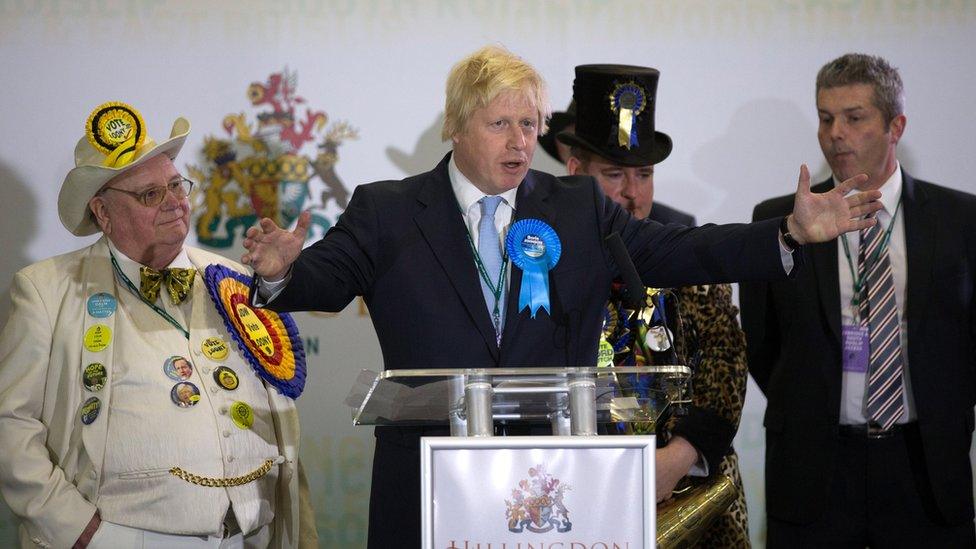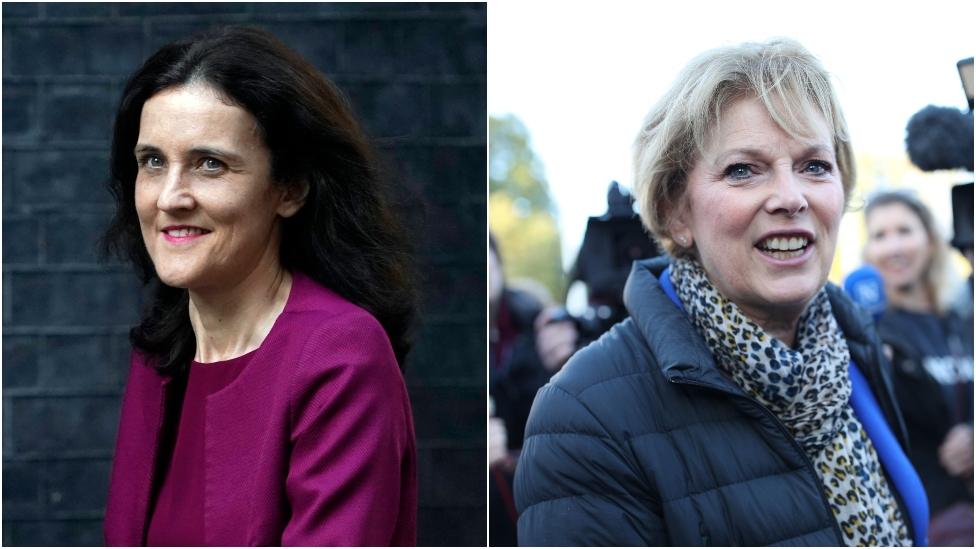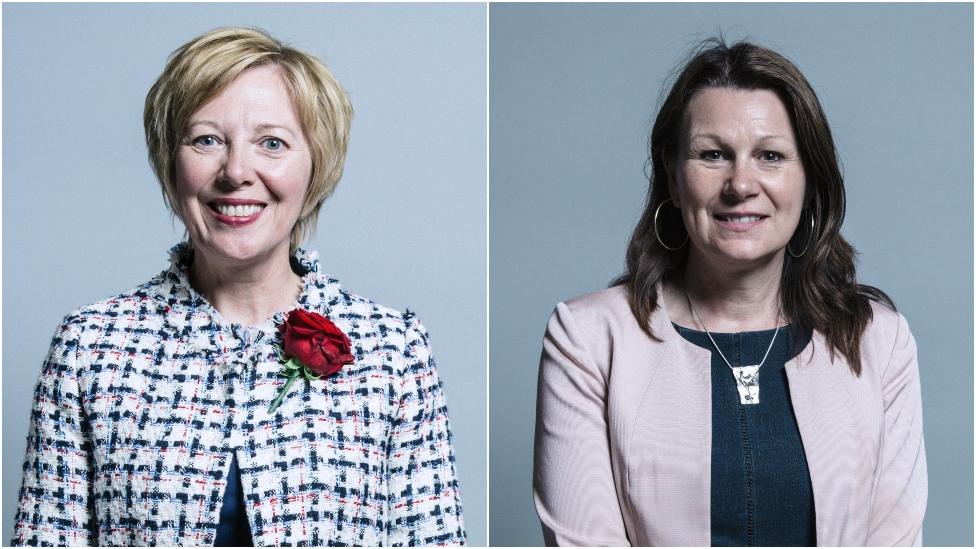General election 2019: The big names facing a nervy election night
- Published

(l-r) Gavin Barwell, Esther McVey and Nick Clegg have lost their seats in past general elections. Esther McVey regained her seat in 2017.
No matter how many opinion polls you run ahead of a general election, you can never know the result until those ballot papers are counted.
And it is candidates in the marginal seats who will be facing the biggest pressure on polling night.
Perhaps even more stress will be piled on the big names who don't want to hit the headlines for losing their place in the Commons.
Think Tory stalwart and cabinet minister Michael Portillo in 1997, or shadow chancellor and Labour loyalist Ed Balls in 2015.
No-one wants a "moment" named after them, but which big guns are facing possible defeat on 12 December?
The traditional definition of a marginal seat is a constituency where the sitting MP won by a margin of 10% or less at the last election.
Using this logic, there are 169 marginal seats across the UK, but in the increasingly volatile world of British politics even those with a bigger cushion are sometimes far from safe.

Boris Johnson giving his victory speech after winning Uxbridge in 2015
Boris Johnson won the seat of Uxbridge and Ruislip South in West London by a majority of just 10.8% of the vote in the 2017 general election.
Compare this to the last majorities of former PMs - 50.2% for Gordon Brown, 45.5% for Theresa May, 44.5% for Tony Blair and 43% for David Cameron - and you can see why this could lead to the biggest upset of the night.
There was a 13% swing to Labour in Uxbridge in 2017 and the opposition parties - including Labour campaign group Momentum - are pushing hard to unseat the PM.


The opposition dream result goes like this: it's the morning after polling day and Boris Johnson isn't even an MP.
Activists trying to oust him claim their supporters have turned out in their hundreds to help. They hope young and ethnic minority voters in Uxbridge could tip the balance.
Is there more to this than hope?
One recent estimate based on nationwide data suggested that while some of his high-profile colleagues could struggle, Boris Johnson would see an increased majority. Another, similar estimate is due shortly.
But stress that word "estimate". Most in the business of forecasting the political future are cautious these days.
If he did lose his seat, and the Conservatives win the general election, what then?
There is a precedent for a prime minister who is neither a member of the House of Commons or House of Lords.
In a soon-to-be-published blog Robert Hazell from University College London points out that Conservative Alec Douglas-Home continued as PM between giving up his seat as a Lord and winning a by-election.
Should Boris Johnson lose he could - Prof Hazell suggests - persuade a colleague in a safe seat to quit, prompt a by-election of his own and have another go.
Even his opponents' dream result might not spell the end of the prime minister's political career.
Here's a full list of the 12 candidates vying for the Uxbridge seat.

Quite a number of Mr Johnson's Cabinet are also heading for a close contest.
Zac Goldsmith has the biggest battle on his hands. The candidate for Richmond Park in West London - and a minister at the Department for Environmental, Food and Rural Affairs - won his seat by just 45 votes in 2017 (or a 0.1% majority).
Here is the full slate of candidates in Richmond Park.
Theresa Villiers, who heads up that department, is not far behind, having won Chipping Barnet by just 353 votes (0.6%). Here is the full list of candidates.
Four more cabinet members find themselves in marginal seats too:
Justice Secretary Robert Buckland won with a majority of 2,464 (4.8%) in Swindon South
International Development Secretary Alok Sharma won with a majority of 2,876 (5.6%) in Reading West
Northern Powerhouse minister Jake Berry won with a majority of 3,216 (6.4%) in Rossendale and Darwen, Lancashire
Chief Whip Mark Spencer won with a majority of 5,198 (9.7%) in Sherwood, Nottinghamshire
And former Welsh secretary Alun Cairns - who resigned his cabinet position at the start of the election over claims he knew about a former aide's role in the "sabotage" of a rape trial - is still running despite the scandal, with a majority of just 2,190 (4.1%) in the Vale of Glamorgan.
A few other notable Tory seats from 2017 will also come under the spotlight on 12 December.
Prominent Brexiteer and former Tory leader Iain Duncan Smith will be fighting to keep his seat of Chingford and Woodford Green on the North East London/Essex border, having won with just a 2,438 (5.2%) majority two years ago.
And while Broxtowe in Nottinghamshire saw a Tory candidate squeeze through to win with a majority of just 863 (1.6%), Anna Soubry is now the leader of the anti-Brexit Independent Group for Change, making the Leave-supporting area very much in play.

Theresa Villiers (left) hopes to remain a Tory MP, while Anna Soubry (right) will be fighting against them
So, what about the Labour frontbench?
It seems a little more certain for the big names in the party - although anything can happen on polling night.
Take Jeremy Corbyn's majority in his north London seat of Islington North last time. He came in with a whopping 60.5% majority - working out at over 33,000 votes.
And shadow chancellor John McDonnell came in with a 37.9% majority in his west London seat of Hayes and Harlington - over 18,000 votes.
But a couple of significant names fall into the marginal category.

Will Dennis Skinner still be Labour's longest-serving MP?
Lesley Laird is the deputy leader of Scottish Labour and the shadow secretary for Scotland, but she only secured her Kirkcaldy and Cowdenbeath seat by a majority of 259 (0.6%).
Shadow environment secretary Sue Hayman also held one of these close call seats - Workington in Cumbria - by 3,925 votes (a 9.4% majority).
There is talk of veteran Labour firebrand Dennis Skinner, known as the Beast of Bolsover, being a key target for the Tories, as the MP only just sneaked over the marginal line with a majority of 5,288 (11.4%).
But other smaller majorities, such as Emma Dent Coad in Kensington, west London - who won by just 20 votes (a 0.1% majority) - and Rosie Duffield in Canterbury - who won by just 187 votes (a 0.3% majority) - there may be lots of lesser known MPs facing the same stress.

Both Lesley Laird (left) and Sue Hayman (right) are fighting in marginal seats for Labour
What about the other parties?
For the Lib Dems, there are two well-known faces who may be crossing their fingers at the count.
Former leader of the party Tim Farron held his Westmorland and Lonsdale seat in Cumbria by a majority of 777 (1.5%) in 2017.
Deputy leader (and former leadership candidate) Sir Ed Davey also only secured his place in Kingston and Surbiton, west London, with a 4,124 (6.6%) majority.
But, while she sneaks over the 10% threshold, it could be a stressful night for leader Jo Swinson. She only won in Dunbartonshire East with a majority of 5,339 (10.3%).
There are two well-known SNP figures to watch out for.
Joanna Cherry, the party's spokesman for justice - who has come to prominence heading a court case against Mr Johnson's unlawful prorogation - won Edinburgh South West by 1,097 (a 2.2% majority).
And Mhairi Black - the so-called "baby of the House" as the youngest member - who is the SNP's spokeswoman on a number of issues, including disability and equalities, won Paisley and Renfrewshire South by a 2,541 majority (6.1%).
The final one to look out for is Nigel Dodds. He leads the DUP in Westminster and has been key in negotiations between his party and both Mr Johnson's and Theresa May's governments.
But with a majority of just 2,081 (4.5%) in Belfast North, there could be shockwaves across Northern Ireland at his departure.